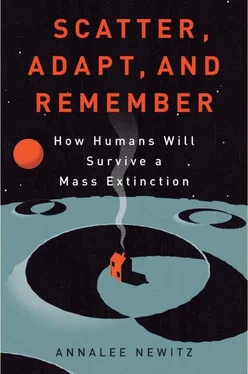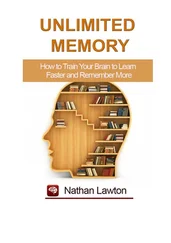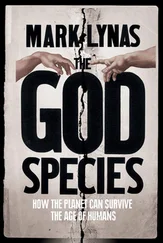Annalee Newitz
SCATTER, ADAPT, AND REMEMBER
HOW HUMANS WILL SURVIVE A MASS EXTINCTION
To Charlie for the words
To Chris for the sounds
To Jesse for the stars
Utopian speculations … must come back into fashion. They are a way of affirming faith in the possibility of solving problems that seem at the moment insoluble. Today even the survival of humanity is a utopian hope.
—Norman O. Brown, from
Life Against Death
INTRODUCTION: Are We All Going to Die?
HUMANITY IS AT a crossroads. We have ample evidence that Earth is headed for disaster, and for the first time in history we have the ability to prevent that disaster from wiping us out. Whether the disaster is caused by humans or by nature, it is inevitable. But our doom is not. How can I say that with so much certainty? Because the world has been almost completely destroyed at least half a dozen times already in Earth’s 4.5-billion-year history, and every single time there have been survivors. Earth has been shattered by asteroid impacts, choked by extreme greenhouse gases, locked up in ice, bombarded with cosmic radiation, and ripped open by megavolcanoes so enormous they are almost unimaginable. Each of these disasters caused mass extinctions, during which more than 75 percent of the species on Earth died out. And yet every single time, living creatures carried on, adapting to survive under the harshest of conditions.
My hope for the future of humanity is therefore not simply a warm feeling I have about how awesome we are. It is based on hard evidence gleaned from the history of survival on Earth. This book is about how life has survived mass extinctions so far. But it is also about the future, and what we need to do to make sure humans don’t perish in the next one.
During the last million years of our evolution as a species, humans narrowly avoided extinction more than once. We lived through harsh conditions while another human group, the Neanderthals, did not. This isn’t just because we are lucky. It’s because as a species, we are extremely cunning when it comes to survival. If we want to survive for another million years, we should look to our history to find strategies that already worked. The title of this book, Scatter, Adapt, and Remember , is a distillation of these strategies. But it’s also a call to implement them in the future, by actively taking on the project of human survival as a social and scientific challenge.
In the near term, we need to improve one of humanity’s greatest inventions, the city, to make urban life healthier and more environmentally sustainable. Essentially, we need to adapt the metropolis to Earth’s current ecosystems so that we can maintain our food supplies and a habitable climate. But even if you’re not worried about climate change, Earth is still a dangerous place. At any time, we could be hit by an asteroid or a gamma-ray burst from space. That’s why we need a long-term plan to get humanity off Earth. We need cities beyond the Blue Marble, oases on other worlds where we can scatter to survive even cosmic disasters.
But none of this will be possible if we don’t remember human history, from our earliest ancestors’ discovery of fire to our grandparents’ development of space programs. Fundamentally, we are a species of builders and explorers. We’ve survived this long by taking control of our destiny. If we want to survive the next mass extinction, we can’t forget how we got here. Now let’s forge ahead into the future that we’ll build for ourselves, our planet, and the humans who will exist a million years from now.
Evidence for the Next Mass Extinction
Over the past four years, bee colonies have undergone a disturbing transformation. As helpless beekeepers looked on, the machinelike efficiency of these communal insects devolved into inexplicable disorganization. Worker bees would fly away, never to return; adolescent bees wandered aimlessly in the hive; and the daily jobs in the colony were left undone until honey production stopped and eggs died of neglect. In reports to agriculture experts, beekeepers sometimes called the results “a dead hive without dead bodies.” The problem became so widespread that scientists gave it a name—Colony Collapse Disorder—and according to the U.S. Department of Agriculture, the syndrome has claimed roughly 30 percent of bee colonies every winter since 2007. As biologists scramble to understand the causes, suggesting everything from fungal infections to parasites and pollution, farmers worry that the bee population will collapse into total extinction. If bees go extinct, their loss will trigger an extinction domino effect because crops from apples to broccoli rely on these insects for pollination.
At the same time, over a third of the world’s amphibian species are threatened with extinction, too, leading many researchers to call this the era of amphibian crisis. But the crisis isn’t just decimating bees and frogs. The Harvard evolutionary biologist and conservationist E. O. Wilson estimates that 27,000 species of all kinds go extinct per year.
Are we in the first act of a mass extinction that will end in the death of millions of plant and animal species across the planet, including us?
That’s what proponents of the “sixth extinction” theory believe. As the term suggests, our planet has been through five mass extinctions before. The dinosaur extinction was the most recent but hardly the most deadly: 65 million years ago, dinosaurs were among the 76 percent of all species on Earth that were extinguished after a series of natural disasters. But 185 million years before that, there was a mass extinction so devastating that paleontologists have nicknamed it the Great Dying. At that time, 95 percent of all species on the planet were wiped out over a span of roughly 100,000 years—most likely from megavolcanoes that erupted for centuries in Siberia, slowly turning the atmosphere to poison. And three more mass extinctions, some dating back over 400 million years, were caused by ice ages, invasive species, and radiation bombardment from space.
The term “sixth extinction” was coined in the 1990s by the paleontologist Richard Leakey. At that time, he wrote a book about how this new mass extinction began 15,000 years ago, when the Americas teemed with mammoths, as well as giant elk and sloths. These turbo-vegetarians were hunted by equally large carnivores, including the saber-toothed cat, whose eight-inch fangs emerged from between the big cat’s lips, curving to well beneath its chin. But shortly after humans’ arrival on these continents, the megafauna populations collapsed. Leakey believes human habitat destruction was to blame for the extinctions thousands of years ago, just as it can be blamed today for the amphibian crisis. Leakey’s rallying cry has resulted in sober scientific papers today, where respected biologists detail the evidence of a mass extinction in the making. The New Yorker ’s environmental journalist Elizabeth Kolbert has tirelessly reported on scientific evidence gathered over the past two decades corroborating the idea that we might be living through the early days of a new mass extinction.
Though some mass extinctions happen quickly, most take hundreds of thousands of years. So how would we know whether one was happening right now? The simple answer is that we can’t be sure. What we do know, however, is that mass extinctions have decimated our planet on a regular basis throughout its history. The Great Dying involved climate change similar to the one our planet is undergoing right now. Other extinctions may have been caused by radiation bombardment or stray asteroids, but as we’ll see in the first section of this book, these disasters’ most devastating effects involved environmental changes, too.
Читать дальше







![Аннали Ньюиц - Автономность [litres]](/books/424681/annali-nyuic-avtonomnost-litres-thumb.webp)





